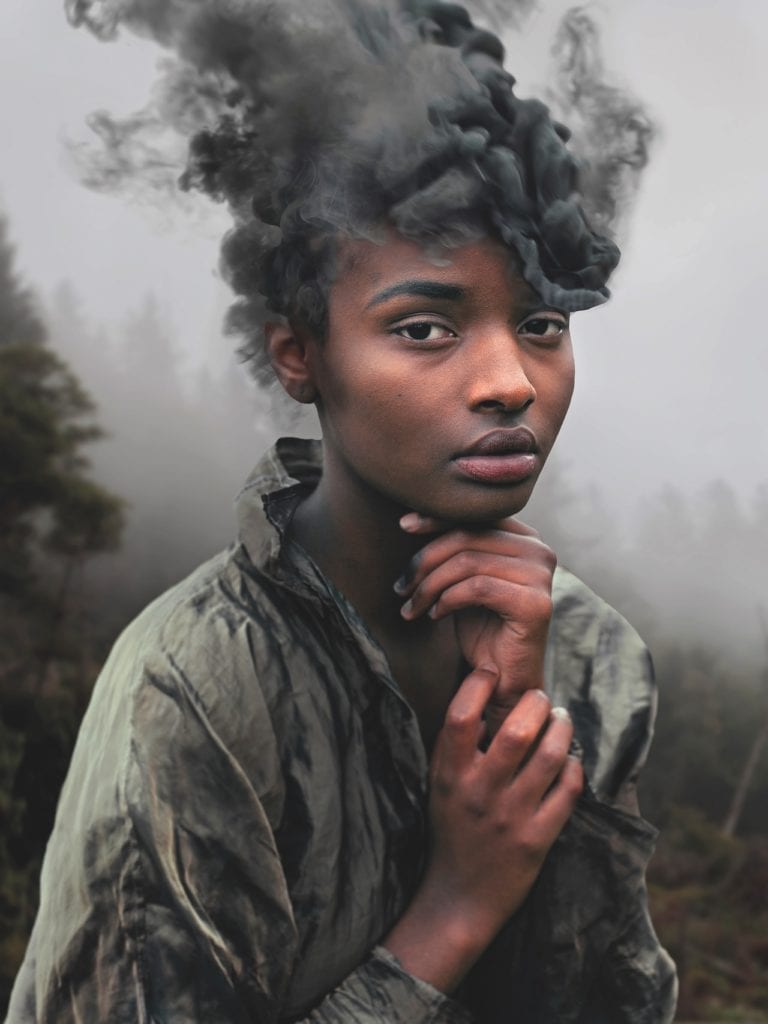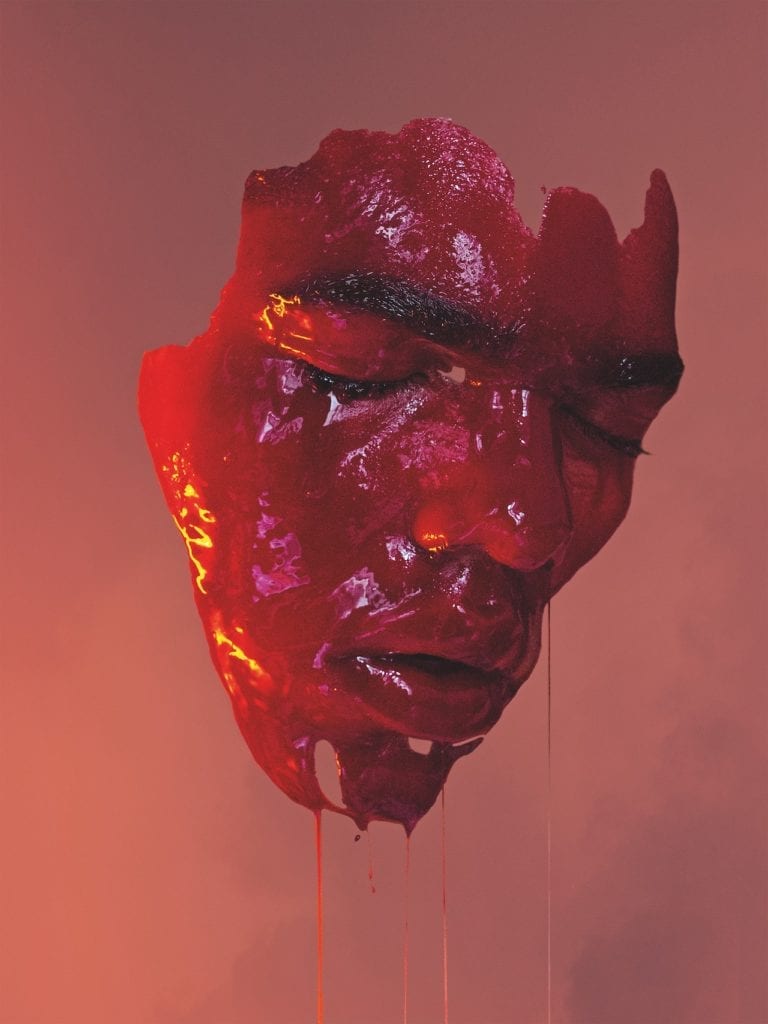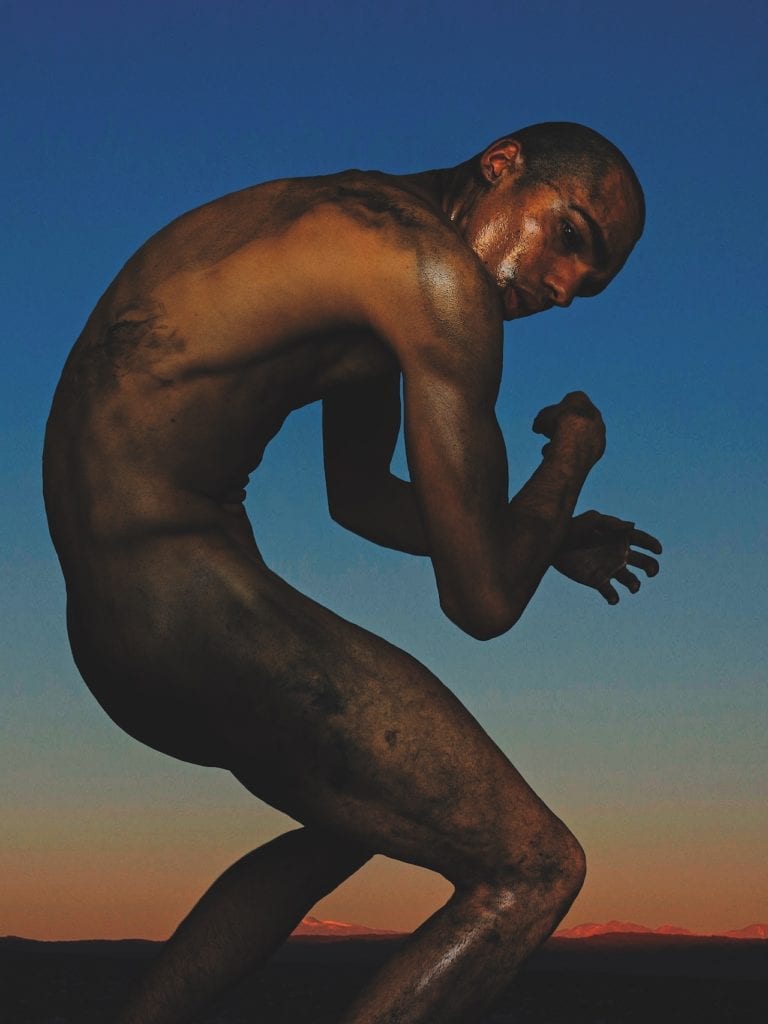Each year, British Journal of Photography presents its Ones To Watch – a group of emerging image-makers, chosen from hundreds of nominations by international experts. Throughout September, BJP-online is sharing their profiles, originally published in issue #7898 of the magazine. David Uzochukwu is one of five Ones to Watch selected by British Journal of Photography to exhibit as part of Futures festival, which takes place throughout October.
David Uzochukwu’s contorted bodies ripple through space — bent, tense, naked. A figure lies beside a pink lake, its back turned, red oozing from beneath its waist. A nude, amorphous form strides out before the ripples of a sunset, arms elongated; muscles tensed. A bare torso emerges from swathes of long grass; a limp figure, with jagged fins, lies slumped atop another man.
“I always want to build a haven through my images, perhaps it is in response to how the spaces I move through receive me,” reflects the 21-year-old photographer, represented by Galerie Number 8, whose fantastical frames carve out space for the multifaceted forms that inhabit them. Pulsing bodies — hybrid and otherwise — leaping, crawling, and bounding through the ephemeral environments, which surround them.
The bodies that populate Uzochukwu’s work also embody the artist’s inner turmoil: the experience of vision shifting between clear and cloudy; the body growing heavy and then light. Lived mental and physical tumult encapsulated in the twisting forms shifting through his work. “I am undeniably fascinated with the surreal,” says Uzochukwu, “I am sure that part of this itch for transcendence is linked to mental health.”

The emotion that floods through Uzochukwu’s images emerged early on. First captivated by photography when he was 13, “a prepubescent holiday crush was into it and the spark jumped over,” Uzochukwu began to experiment. “That practical, isolated process quickly turned therapeutic,” continues Uzochukwu, whose body features heavily in his work, providing a medium through which he may meditate upon perceptions and expressions of the human form, gender, and emotion.
Amid the tumult and emotion, Uzochukwu also explores the potential for transformation and rebirth. His subjects transcend a reality that would otherwise relegate them to the margins, and the natural landscapes they inhabit further that escape. “Nature feels timeless, like the promise of freedom,” he says. “In overwhelming moments, which fill us with emotion, what remains of our identity? How are we simultaneously reduced, and something more?”
Uzochukwu’s distinct aesthetic, which he describes as colourful, bold and organically-digital, as well as an unwavering commitment to his work, earned him critical-acclaim early on in his career. He spent his gap year working as a commercial photographer; a valuable experience but one which affirmed the importance of his personal work: “I love the challenge of a good assignment … But I need to find a sustainable long-term model: space for long term processes, experimentation free of expectations.”

To date, the photographer has collaborated with high-profile, celebrity artists such as FKA Twigs, who hand-picked him to shoot a major campaign for Nike in Mexico when he was just 17. Other clients include Little Dragon, Ibeyi and Pharrell Williams, and he has received commissions from Nike, Dior and Hermès. His work has also been exhibited at numerous venues and festivals including Photo Vogue, Unseen Amsterdam, and LagosPhoto. However, rather than pursue photography full-time, Uzochukwu, who is completely self-taught, is currently studying a BA in Philosophy at Humboldt University, Berlin. “It helps me recognise threads in my work and the essential questions that I want to address at some point,” he says of his degree. “But it also just shapes me as a person”.
Uzochukwu’s father is Nigerian, but he grew up in several European countries. It is a personal history that has led him to think deeply about conceptions of race, home and belonging. He was born and raised in Innsbruck, Austria, in a largely white community, which often felt oppressive. However, it was only during his teenage years that Uzochukwu properly acknowledged the societal and systematic racism he had suffered. “I shifted the focus of my portraiture to Black and people of colour, around the time it sunk in that I was a racialised person,” he reflects.

Along with a handful of film projects, the artist is currently working on a series on race and water, which premiered at Unseen Amsterdam in 2019, water being a recurring motif in his work and a long-term fascination. Existing series include A Familiar Ruin (2016) in which Uzochukwu coats himself in tar, expressing the extent that prejudice has affected him. More recently, Pluton celebrates the young Nigerians shaping their country’s rich creative scene.
Uzochukwu describes his work: “Like honey on a thorn.” The phrase encapsulates it perfectly: Uzochukwu’s images are both alluring and uncanny, and, beneath the surface, the sensuous forms and bold colours, it is clear that something far more complex is playing out. Uzochukwu’s photographs provide a vessel for his internal world, his thoughts, his experiences, his emotions. And so, as he develops as an artist, and grows as a person, it is undoubted that his work will continue to evolve and deepen too.
